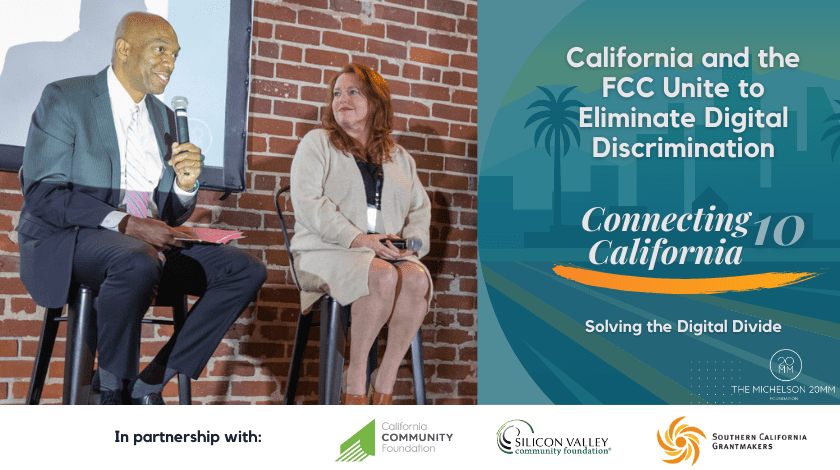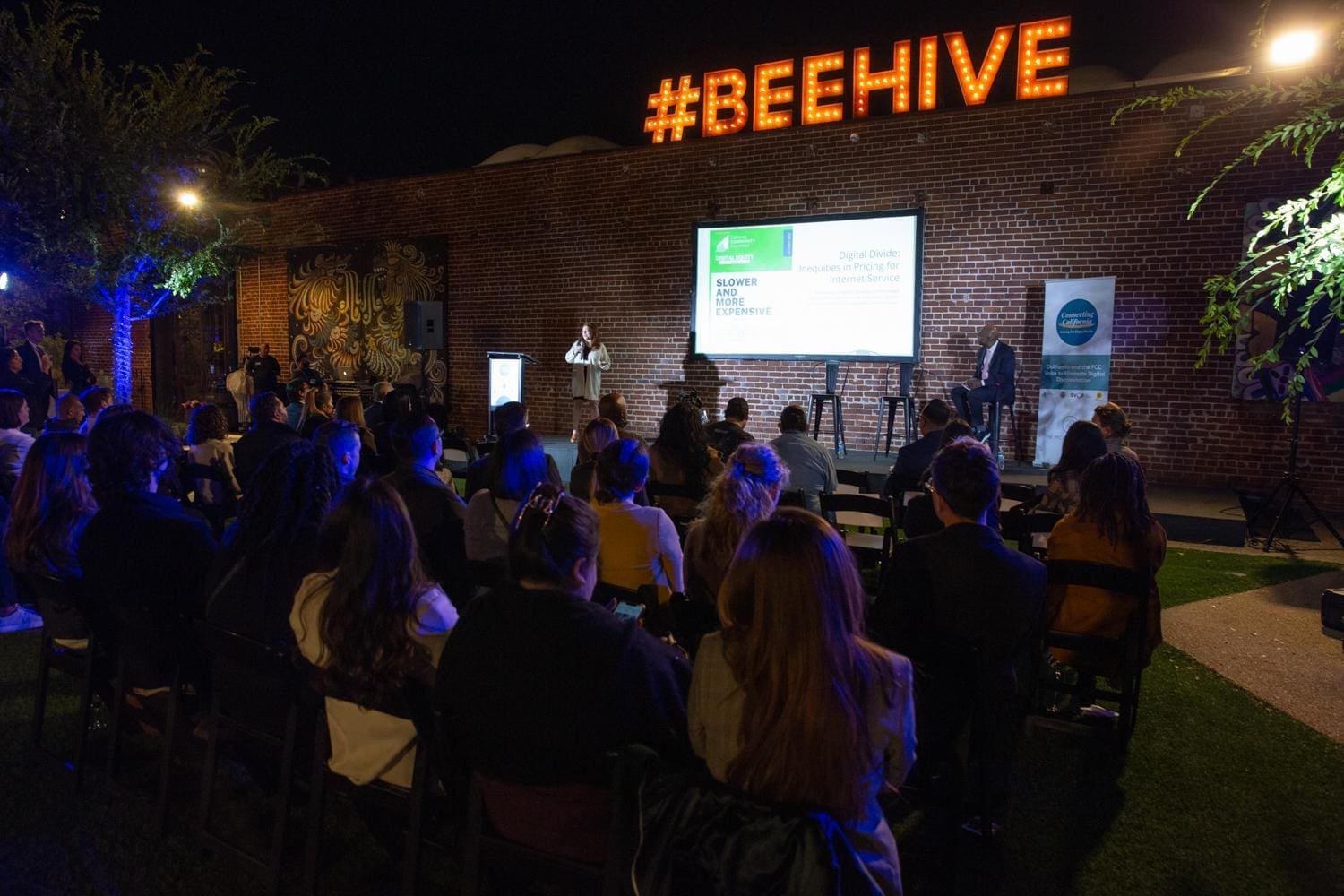FCC chair calls for a renewed focus on solving the digital divide during the Michelson 20MM Foundation’s in-person town hall at The Beehive in South Los Angeles.

By Justin Chapman
“It’s time to address digital discrimination with new urgency,” said Federal Communications Commission (FCC) Chair Jessica Rosenworcel in remarks read by FCC Special Advisor Sanford Williams at the Michelson 20MM Foundation’s first in-person event since the start of the pandemic.
“In the very first sentence of the Communications Act, Congress directs the FCC to help make communications services available to all the people of the United States without discrimination,” Rosenworcel said. “We can do this. We need to. It’s about equity opportunity, making it possible for everyone to have a fair shot at 21st century success. We seek to identify the policies and practices that can lead to digital discrimination, recognizing that this won’t be easy. We’re going to do it in a thoughtful way.”
The town hall, entitled “California and the FCC Unite to Eliminate Digital Discrimination,” was the 10th installment of the Michelson 20MM Foundation’s “Connecting California: Solving the Digital Divide” learning series. It was hosted in partnership with the California Community Foundation, the Silicon Valley Community Foundation, and Southern California Grantmakers at The Beehive in South Los Angeles, home of the SoLa Impact Foundation’s Technology and Entrepreneurship Center.
Driven by the federal government’s historic $65 billion investment in broadband, the FCC recently launched a cross-agency Task Force to Prevent Digital Discrimination, which seeks to realize digital equity throughout the nation. Williams, a lecturer of law at UCLA Law School and both a Special Advisor to Rosenworcel and a deputy managing director at the FCC, was joined onstage by Dr. Gary K. Michelson, founder of Michelson Philanthropies; LA City Councilman Curren Price Jr.; and Shayna Englin, director of the California Community Foundation’s Digital Equity Initiative.
“It’s time to address digital discrimination with new urgency.” —Jessica Rosenworcel, chair of the Federal Communications Commission
“National data tells us that the population most impacted by the digital divide is people of color, and that’s why events like this are so important because it focuses on where the real needs are,” Price said. “The Michelson 20MM Foundation has been a tireless education and digital equity advocate, not just in LA, but throughout the state of California for more than a decade. We all know that eliminating discrimination is not something that can be done alone. We need all hands on deck to make sure that both the public and the private sector are involved. We’re imagining a future where digital discrimination doesn’t exist.”
Williams described digital discrimination as the lack of equal access to digital or broadband resources, and added that he believes equal access to these resources is a human right. He said the pandemic widened the digital divide in the fields of education, health, work, and beyond.
“The pandemic is the imprint of trauma on the United States in many ways,” he said. “The trauma was exacerbated by an inequitable access to broadband. One of our foremost goals of the FCC is to ensure that every person in the United States has equal access to high-quality, affordable broadband. Never before has a need for such access been greater. From telehealth to education to work, everybody in our country deserves and must have equal broadband access.”
Englin’s organization compiled a report with data comparing what people must pay for internet access in different communities of LA County. Their research showed that people who live in a community with higher poverty rates, with a high density of immigrant families, and with a high density of renters are offered much higher prices for lower quality service from the major internet service providers (ISPs). These snapshots weren’t outliers, Englin said, but rather a disturbing pattern.
“Access to the internet is a human right,” she said. “It is also just an absolutely necessary precondition these days to actually participating and being an active member of society, to having a job, to learning, and to getting health care. When you ask people who don’t have internet at home ‘why not,’ they overwhelmingly say it’s because they can’t afford it, or because what they can afford is not high enough quality to be worth the expense.”
“Access to the internet is a human right. It is also just an absolutely necessary precondition these days to actually participating and being an active member of society, to having a job, to learning, and to getting health care.”
—Shayna Englin, Director of the California Community Foundation’s Digital Equity Initiative
ISPs provide their best offers—high speed at low cost—to those in the highest income communities in LA County. Not only that, but they also offer worse terms and conditions in lower income communities.
“If what you want is a great rate for fast, reliable internet, you should move to Beverly Hills, because you will get an amazing offer, and that offer will be good for two years,” she said. “Whereas if you live in, say, Watts or South LA, you will be offered a much higher price, sometimes as much as $50 more a month, and that price will only be good for one year before it goes up.”
For example, they looked at Spectrum’s Internet Ultra, the only service level offered by that company at every single address in LA County. In Watts, Ultra was offered for $70 a month, a price good for one year. Over in Manhattan Beach, which has a poverty rate of 2 percent, that same Ultra was offered for $30 a month, and that price was guaranteed for two years. In Compton, with a poverty rate of 30 percent, the lowest service tier was $50 a month, good for one year. Five miles away in Mar Vista, with a poverty rate of 1 percent, that same internet is $20 a month, good for two years.
“In South LA, with overwhelmingly Black and Brown communities, every single address we looked at had that $70 a month guaranteed for just one year for Internet Ultra,” she said. “Every address that we looked at in Mar Vista was $30 a month, guaranteed for two years for that same service. The company’s response has been that we’re cherry picking—we’re not. Happy to provide all the data. We have screenshots for every data point in our report.”
She argued that this pattern deeply exacerbates the digital divide.
“The trauma [of the pandemic] was exacerbated by an inequitable access to broadband. From telehealth to education to work, everybody in our country deserves and must have equal broadband access.”
—Sanford Williams, FCC Special Advisor
“We can be investing $14.2 million in giving people a $30 discount on their internet, but if in turn, those same companies that they have to rely on to provide that internet are increasing the price by $30 to $50, it’s going to be a lot harder to make a dent on that,” she said. “Not to mention just the infuriatingly unfair nature of how that works.”
She called for a further investigation into this situation in LA, California, and across the United States.
“They claim that we got it wrong? Cool, they should provide the data to prove it,” she said. “We work in 41 states, and in every single state that we have looked, we have found this exact pattern.”
She also said equal access should be the law of the land and should be built into local, county, and state procurement policy. She pointed out that the city of LA is considering a $30 million contract renewal with Charter Spectrum.
“That seems like a great opportunity to ask them about this and make it not a thing that’s possible,” she said. “You should not get $30 million of city money and be able to do this.”
Finally, she called for more options for service, including community-driven options.
“It shouldn’t be that you get Spectrum or you get nothing,” she said. “The experience across the country and across the world is that when you have less monopolistic markets, you have better pricing and better service.”
Additionally, FCC Chair Rosenworcel called for diversifying the FCC to reflect the country.
“I’m the first woman ever confirmed as chair of the FCC, and here’s what I want to leave behind: a diverse agency that is more committed than ever before to realizing the power of broadband for all,” Rosenworcel said in her remarks. “I believe that goal is within reach. Now let’s use this proceeding to help us make it happen.

